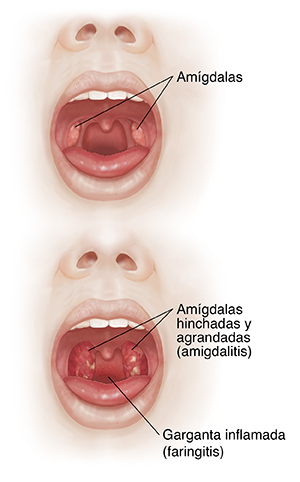When You Have a Sore Throat
When You Have a Sore Throat
A sore throat can be painful. There are many reasons why you may have a sore throat. Your healthcare provider will work with you to find the cause of your sore throat. He or she will also find the best treatment for you.
What causes a sore throat?
Sore throats can be caused or worsened by:
Cold or flu viruses
Bacteria
Irritants such as tobacco smoke or air pollution
Acid reflux
A healthy throat
The tonsils are on the sides of the throat near the base of the tongue. They collect viruses and bacteria and help fight infection. The throat (pharynx) is the passage for air. Mucus from the nasal cavity also moves down the passage.
An inflamed throat
The tonsils and pharynx can become inflamed due to a cold or flu virus. Postnasal drip (excess mucus draining from the nasal cavity) can irritate the throat. It can also make the throat or tonsils more likely to be infected by bacteria. Severe, untreated tonsillitis in children or adults can cause a pocket of pus (abscess) to form near the tonsil.
Your evaluation
A medical evaluation can help find the cause of your sore throat. It can also help your healthcare provider choose the best treatment for you. The evaluation may include a health history, physical exam, and diagnostic tests.
Health history
Your healthcare provider may ask you the following:
How long has the sore throat lasted and how have you been treating it?
Do you have any other symptoms, such as body aches, fever, or cough?
Does your sore throat recur? If so, how often? How many days of school or work have you missed because of a sore throat?
Do you have trouble eating or swallowing?
Have you been told that you snore or have other sleep problems?
Do you have bad breath?
Do you cough up bad-tasting mucus?
Physical exam
During the exam, your healthcare provider checks your ears, nose, and throat for problems. He or she also checks for swelling in the neck, and may listen to your chest.
Possible tests
Other tests your healthcare provider may perform include:
A throat swab to check for bacteria such as streptococcus (the bacteria that causes strep throat)
A blood test to check for mononucleosis (a viral infection)
A chest X-ray to rule out pneumonia, especially if you have a cough
Treating a sore throat
Treatment depends on many factors. What is the likely cause? Is the problem recent? Does it keep coming back? In many cases, the best thing to do is to treat the symptoms, rest, and let the problem heal itself. Antibiotics may help clear up some bacterial infections. For cases of severe or recurring tonsillitis, the tonsils may need to be removed.
Relieving your symptoms
Don’t smoke, and avoid secondhand smoke.
For children, try throat sprays or Popsicles. Adults and older children may try lozenges.
Drink warm liquids to soothe the throat and help thin mucus. Avoid alcohol, spicy foods, and acidic drinks such as orange juice. These can irritate the throat.
Gargle with warm saltwater (1 teaspoon of salt to 8 ounces of warm water).
Use a humidifier to keep air moist and relieve throat dryness.
Try over-the-counter pain relievers such as acetaminophen or ibuprofen. Use as directed, and don’t exceed the recommended dose. Don’t give aspirin to children.
Are antibiotics needed?
If your sore throat is due to a bacterial infection, antibiotics may speed healing and prevent complications. Although group A streptococcus ("strep throat" or GAS) is the major treatable infection for a sore throat, GAS causes only 5% to 15% of sore throats in adults who seek medical care. Most sore throats are caused by cold or flu viruses. And antibiotics don’t treat viral illness. In fact, using antibiotics when they’re not needed may produce bacteria that are harder to kill. Your healthcare provider will prescribe antibiotics only if he or she thinks they are likely to help.
If antibiotics are prescribed
Take the medicine exactly as directed. Be sure to finish your prescription even if you’re feeling better. And be sure to ask your healthcare provider or pharmacist what side effects are common and what to do about them.
Is surgery needed?
In some cases, tonsils need to be removed. This is often done as outpatient (same-day) surgery. Your healthcare provider may advise removing the tonsils in cases of:
Several severe bouts of tonsillitis in a year. “Severe” episodes include those that lead to missed days of school or work, or that need to be treated with antibiotics.
Tonsillitis that causes breathing problems during sleep
Tonsillitis caused by food particles collecting in pouches in the tonsils (cryptic tonsillitis)
Call your healthcare provider if any of the following occur:
Symptoms worsen, or new symptoms develop.
Swollen tonsils make breathing difficult.
The pain is severe enough to keep you from drinking liquids.
A skin rash, hives, or wheezing develops. Any of these could signal an allergic reaction to antibiotics.
Symptoms don’t improve within a week.
Symptoms don’t improve within 2 to 3 days of starting antibiotics.
Updated:
October 09, 2017
Sources:
Evaluation of Acute Pharyngitis in Adults, UpToDate.
Reviewed By:
Fraser, Marianne, MSN, RN,Image reviewed by StayWell medical illustration team.,Kacker, Ashutosh, MD
